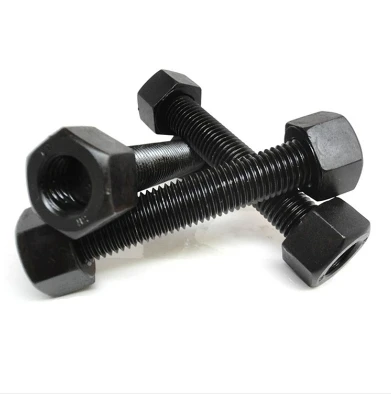stud bolts
ян. . 23, 2025 03:24 Back to list
stud bolts
For industries dealing with heavy machinery or critical infrastructure, the integrity of assembly components is paramount. One essential component often overlooked is the stud bolt. Not just an ordinary fastener, stud bolts are imperative for the secure and efficient operation of various systems in fields such as petrochemical, oil and gas, and manufacturing. Understanding the unique advantages, applications, and expertise involved with stud bolts can enhance operational safety and efficiency.
Authority in the stud bolt sector is bolstered by adherence to various international standards. Organizations like ASTM and ASME provide essential guidelines and specifications that govern the manufacturing and application of stud bolts. Complying with these standards is critical as it ensures stud bolts are capable of meeting stringent requirements necessary for safety and performance in industrial applications. Manufacturers with a reputation for producing stud bolts to these specifications stand out as leaders in the industry. Their products offer assurance of quality and consistency, which are non-negotiable in fields fraught with potential hazards. Trustworthiness in the context of stud bolts also emerges from thorough testing and quality control procedures. Reputable manufacturers employ rigorous testing methods, including ultrasonic testing, tensile testing, and hardness inspections, to ensure each stud bolt meets the necessary performance criteria. For end users, selecting stud bolts from sources that prioritize quality assurance translates to enhanced confidence in the reliability of their installations. In conclusion, the essential role of stud bolts in ensuring the stability and safety of industrial operations cannot be understated. Quality materials, precise manufacturing, and adherence to standards are central to their efficacy. Insights drawn from extensive experience and expertise corroborate the significant value that stud bolts add to industrial applications. As a result, understanding their specific applications, correct installation procedures, and compliance with authoritative standards is invaluable. This comprehensive knowledge base not only improves operational outcomes but also reinforces trust in the structural integrity of vital industrial systems.


Authority in the stud bolt sector is bolstered by adherence to various international standards. Organizations like ASTM and ASME provide essential guidelines and specifications that govern the manufacturing and application of stud bolts. Complying with these standards is critical as it ensures stud bolts are capable of meeting stringent requirements necessary for safety and performance in industrial applications. Manufacturers with a reputation for producing stud bolts to these specifications stand out as leaders in the industry. Their products offer assurance of quality and consistency, which are non-negotiable in fields fraught with potential hazards. Trustworthiness in the context of stud bolts also emerges from thorough testing and quality control procedures. Reputable manufacturers employ rigorous testing methods, including ultrasonic testing, tensile testing, and hardness inspections, to ensure each stud bolt meets the necessary performance criteria. For end users, selecting stud bolts from sources that prioritize quality assurance translates to enhanced confidence in the reliability of their installations. In conclusion, the essential role of stud bolts in ensuring the stability and safety of industrial operations cannot be understated. Quality materials, precise manufacturing, and adherence to standards are central to their efficacy. Insights drawn from extensive experience and expertise corroborate the significant value that stud bolts add to industrial applications. As a result, understanding their specific applications, correct installation procedures, and compliance with authoritative standards is invaluable. This comprehensive knowledge base not only improves operational outcomes but also reinforces trust in the structural integrity of vital industrial systems.
Next:
Latest news
-
Top Wire Bolts Suppliers - Quality & Durable Fasteners
NewsAug.15,2025
-
Trusted Wire Bolts Company | Quality Fasteners Supplier
NewsAug.14,2025
-
Reliable Wire Bolts Suppliers & Manufacturers for Global Needs
NewsAug.13,2025
-
High-Quality Bolts for Lawn Mower Handle Supplier
NewsAug.12,2025
-
Leading Phosphated Drywall Screws Supplier | Bulk & Custom Orders
NewsAug.11,2025
-
Top Wire Bolts Company: Manufacturers, Exporters & Suppliers
NewsAug.10,2025
